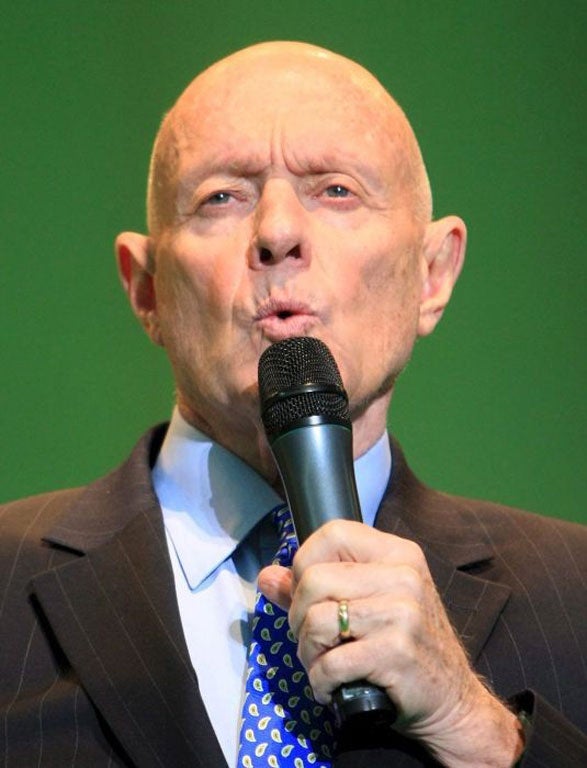Stephen Covey: Management guru whose advice spawned a multi-million dollar empire

Stephen Covey was widely regarded as one of the most successful management gurus of all time. With his 1989 book The Seven Habits of Highly Effective People selling over 20 million copies worldwide in 40 languages and spawning a multi-million pound business empire, Covey was catapulted to fame, winning a global following and a five-year run on bestseller lists by fusing the genres of self-help and business literature.
Named in 1996 as one of Time magazine's 25 most influential Americans, Covey dedicated his life to demonstrating, in his view, how every person can control their destiny with profound yet straightforward guidance. Although critics scoffed at its simplicity, Covey's advice struck a chord with millions, even if many of his principles have become clichés.
According to the Harvard lecturer Barbara Kellerman, his "timing was perfect. He really caught the wave... as people were becoming increasingly fascinated with leadership. He addressed ordinary people's desire to succeed through leadership and management."
Covey's clients included three-quarters of the Fortune 500 companies, and numerous universities and government entities. He also trained many heads of state, including the presidents of Colombia and South Korea, as well as their cabinets. In 1994, President Bill Clinton, a Covey fan, announced that American productivity would greatly increase if people followed Covey's advice.
Guided by his Mormon faith, Covey's book drew inspiration from the Scriptures and from history's great thinkers. He readily quoted Peter Drucker, the management guru who claimed that "effectiveness is a habit." Covey summed up his philosophy in seven "unchanging principles", or habits: 1) be proactive; 2) begin with the end in mind; 3) put first things first; 4) think win-win; 5) seek first to understand, then to be understood; 6) synergise; 7) "Sharpen the saw", i.e. seek constantly to improve oneself.
Covey later said, "We believe that organisational behaviour is individual behaviour collectivised." In 2004, he expanded on this, adding an eighth habit: find your voice and inspire others to find theirs. His lectures were often liberally sprinkled with terms such as "synergy" and "paradigm shift," but he also urged businesses to consider how employees feel.
In explaining his second habit, "begin with the end in mind", Covey urged people to consider how they would like to be remembered. "If you carefully consider what you want to be said of you in the funeral experience," he said, "you will find your definition of success."
Born in Salt Lake City, Utah, in 1932, Stephen Richards Covey was the son of Stephen and Irene, a close-knit Mormon family on the outskirts of town. As a teenager he was forced to give up a promising sporting career due to a degenerative bone condition, which left him using crutches for three years. Encouraged by his parents, particularly his mother, who constantly re-enforced the idea that "You can do anything you want," Covey refocused on his studies.
At 16, he entered the University of Utah to read business administration, then had a two-year spell as a Mormon missionary in Britain, where part of his work involved training provincial heads of the church. This experience altered his parents' plans for him to take over the family hotel business. "I got so turned on by the idea of training leaders that it became my whole life's mission," he recalled. He then returned to the US and earned an MBA from Harvard Business School.
Another spell as a missionary in Ireland followed before he completed his doctorate in religious education from Utah's Brigham Young University in 1976. He became an assistant to the university's president and began teaching his self-help ideas on campus to as many as 1,000 students at a time. In 1983, he left to establish the Covey Leadership Centre in Provo, Utah.
In 1997, the Centre merged with a rival, Franklin Quest, founded by Hyrum Smith, a time-management expert, to form FranklinCovey Co, focussing on leadership, strategy and individual effectiveness. It now operates in more than 50 countries and in 2011 had sales of $160.8 million.
Covey wrote further bestsellers about business management, including Principle-Centred Leadership, and became a favourite motivational speaker on the Fortune 100 circuit. He also served as a personal consultant to organisations ranging from Procter & Gamble to Nasa.
In 2011, Covey was named one of the world's top 50 business thinkers by Thinkers50, a group that compiles that list every two years. He received many honorary doctorates and awards, including the International Entrepreneur of the Year Award (2008).
Covey died from complications following a cycling accident three months ago. He is survived by his wife of 55 years, Sandra, and their nine children and more than 50 grandchildren.
Stephen Richards Covey, entrepreneur, educator and author: born Salt Lake City, Utah 24 October 1932; married 1957 Sandra Merrill (nine children); died Idaho Falls, Idaho 16 July 2012.
Subscribe to Independent Premium to bookmark this article
Want to bookmark your favourite articles and stories to read or reference later? Start your Independent Premium subscription today.

Join our commenting forum
Join thought-provoking conversations, follow other Independent readers and see their replies